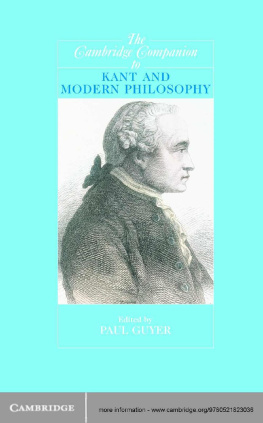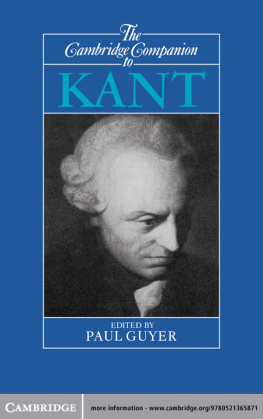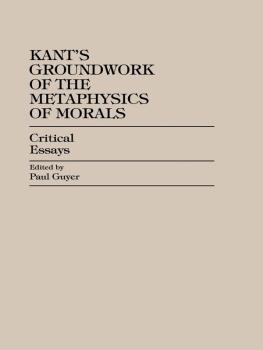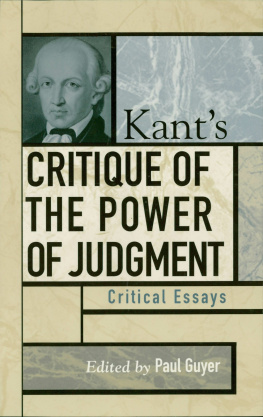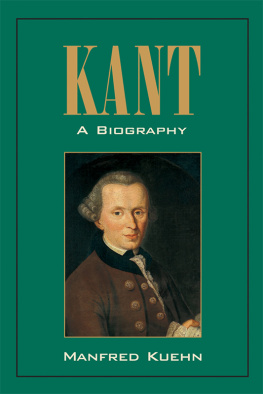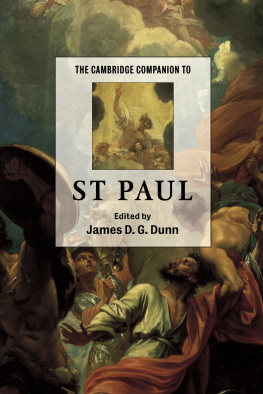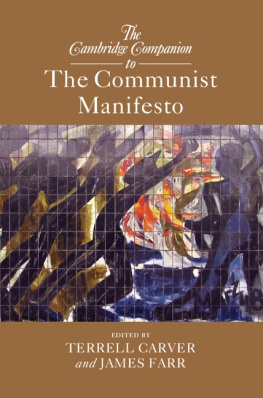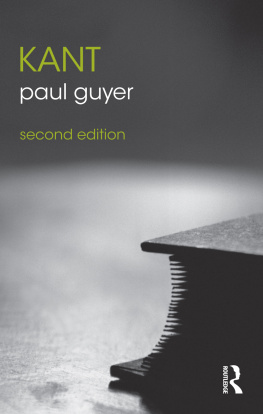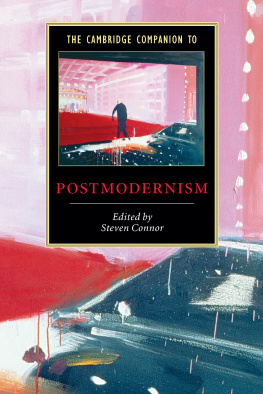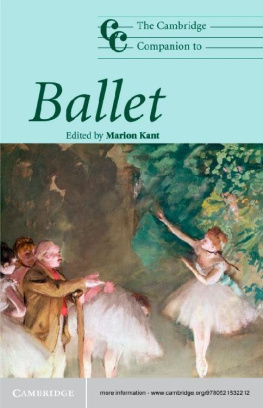Paul Guyer (ed.) - The Cambridge Companion to Kant and Modern Philosophy
Here you can read online Paul Guyer (ed.) - The Cambridge Companion to Kant and Modern Philosophy full text of the book (entire story) in english for free. Download pdf and epub, get meaning, cover and reviews about this ebook. year: 2006, publisher: Cambridge University Press, genre: Science. Description of the work, (preface) as well as reviews are available. Best literature library LitArk.com created for fans of good reading and offers a wide selection of genres:
Romance novel
Science fiction
Adventure
Detective
Science
History
Home and family
Prose
Art
Politics
Computer
Non-fiction
Religion
Business
Children
Humor
Choose a favorite category and find really read worthwhile books. Enjoy immersion in the world of imagination, feel the emotions of the characters or learn something new for yourself, make an fascinating discovery.
- Book:The Cambridge Companion to Kant and Modern Philosophy
- Author:
- Publisher:Cambridge University Press
- Genre:
- Year:2006
- Rating:3 / 5
- Favourites:Add to favourites
- Your mark:
- 60
- 1
- 2
- 3
- 4
- 5
The Cambridge Companion to Kant and Modern Philosophy: summary, description and annotation
We offer to read an annotation, description, summary or preface (depends on what the author of the book "The Cambridge Companion to Kant and Modern Philosophy" wrote himself). If you haven't found the necessary information about the book — write in the comments, we will try to find it.
The Cambridge Companion to Kant and Modern Philosophy — read online for free the complete book (whole text) full work
Below is the text of the book, divided by pages. System saving the place of the last page read, allows you to conveniently read the book "The Cambridge Companion to Kant and Modern Philosophy" online for free, without having to search again every time where you left off. Put a bookmark, and you can go to the page where you finished reading at any time.
Font size:
Interval:
Bookmark:
The philosophy of Immanuel Kant is the watershed of modern thought, which irrevocably changed the landscape of the field and prepared the way for all the significant philosophical movements of the nineteenth and twentieth centuries. This volume, which complements The Cambridge Companion to Kant , covers every aspect of Kants philosophy, with an expanded focus on his moral and political philosophy. It also provides detailed coverage of Kants historical context and of the enormous impact and influence that his work has had on the subsequent history of philosophy. The bibliography provides extensive and organized coverage of both classical and recent books on Kant in the main languages of Kant scholarship. This volume thus provides the broadest and deepest introduction to Kant and his place in modern philosophy currently available. It makes the philosophical enterprise of Kant accessible to those coming to his work for the first time.
Paul Guyer is Florence R. C. Murray Professor in the Humanities at the University of Pennsylvania. The editor and translator of three volumes in the Cambridge Edition of the Works of Immanuel Kant , he is the author of more than 150 articles and six books. He has held fellowships from the John Simon Guggenheim Memorial Foundation, the National Endowment for the Humanities, and at the Princeton University Center for Human Values. He is a member of the American Academy of Arts and Sciences.
For a list of titles published in the series, please see .

This publication is in copyright. Subject to statutory exception and to the provisions of relevant collective licensing agreements, no reproduction of any part may take place without the written permission of Cambridge University Press.
Cambridge University Press has no responsibility for the persistence or accuracy of URLS for external or third-party Internet Web sites referred to in this publication and does not guarantee that any content on such Web sites is, or will remain, accurate or appropriate.
The Cambridge Companion to Kant was published in 1992. Since that time, interest in Kant has remained strong and Kant scholarship has continued to flourish. When the late and dearly missed Terry Moore, at that time Executive Editor of the Humanities at Cambridge University Press, first proposed this volume, he may have had in mind that the authors of the 1992 text would update their essays and that I would update the bibliography. But it seemed to me that it would be more interesting to produce a very different volume that would supplement rather than supplant the earlier book. I have been fortunate to be able to recruit new essays from some of the contributors to The Cambridge Companion to Kant , although in many cases they have written on topics different from those they addressed in that volume. And I have been equally fortunate in signing up a healthy number of new contributors, including both senior members of the community of Kant scholars and several of the brightest new lights in the field.
This new volume is larger than the earlier book primarily because it includes more extensive coverage of Kants moral and political philosophy. The aims of this Companion are also somewhat different than those of the first. To write the history of the position of Kant in modern philosophy, that is, of both his response to previous philosophy and his impact on the subsequent history of philosophy, would be tantamount to writing a comprehensive history of modern philosophy, and at this point in time may well be beyond the capacity of any single person. But I thought that this volume could make at least a start on such a project, and accordingly asked that each essay address both the historical context and the historical impact of the particular topic in Kant that it concerns. Contributors have responded to this charge in different ways, but all have done so in interesting ways. I therefore hope that this volume will not only introduce readers to the extraordinary breadth as well as depth of Kants thought, but also make a start on the project of assessing the extraordinary breadth and depth of Kants influence on the entire course of modern philosophy.
In addition to Terry Moore, who has left the whole series of Cambridge Companions to the philosophers as one among the many lasting monuments to his lifes work at Cambridge University Press, two of the contributors to the earlier Companion , Eva Schaper and J. Michael Young, have also passed away since 1992. They are all remembered here with affection and gratitude. I am also grateful to Beatrice Rehl for her unstinting support in spite of the circumstances in which she inherited this project.
Font size:
Interval:
Bookmark:
Similar books «The Cambridge Companion to Kant and Modern Philosophy»
Look at similar books to The Cambridge Companion to Kant and Modern Philosophy. We have selected literature similar in name and meaning in the hope of providing readers with more options to find new, interesting, not yet read works.
Discussion, reviews of the book The Cambridge Companion to Kant and Modern Philosophy and just readers' own opinions. Leave your comments, write what you think about the work, its meaning or the main characters. Specify what exactly you liked and what you didn't like, and why you think so.

